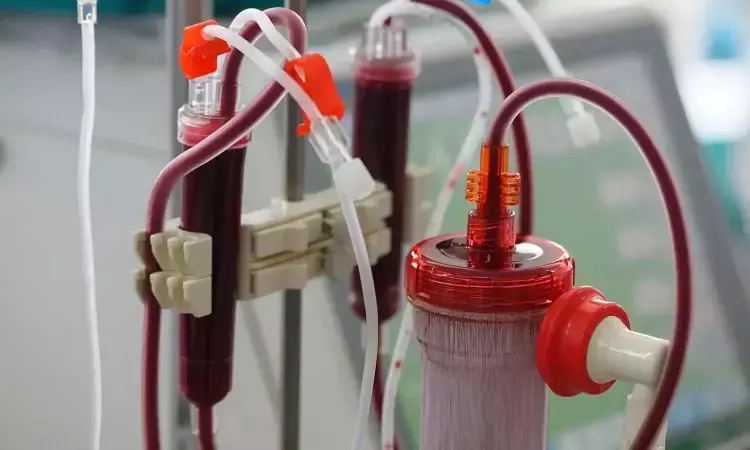- Home
- Medical news & Guidelines
- Anesthesiology
- Cardiology and CTVS
- Critical Care
- Dentistry
- Dermatology
- Diabetes and Endocrinology
- ENT
- Gastroenterology
- Medicine
- Nephrology
- Neurology
- Obstretics-Gynaecology
- Oncology
- Ophthalmology
- Orthopaedics
- Pediatrics-Neonatology
- Psychiatry
- Pulmonology
- Radiology
- Surgery
- Urology
- Laboratory Medicine
- Diet
- Nursing
- Paramedical
- Physiotherapy
- Health news
- Fact Check
- Bone Health Fact Check
- Brain Health Fact Check
- Cancer Related Fact Check
- Child Care Fact Check
- Dental and oral health fact check
- Diabetes and metabolic health fact check
- Diet and Nutrition Fact Check
- Eye and ENT Care Fact Check
- Fitness fact check
- Gut health fact check
- Heart health fact check
- Kidney health fact check
- Medical education fact check
- Men's health fact check
- Respiratory fact check
- Skin and hair care fact check
- Vaccine and Immunization fact check
- Women's health fact check
- AYUSH
- State News
- Andaman and Nicobar Islands
- Andhra Pradesh
- Arunachal Pradesh
- Assam
- Bihar
- Chandigarh
- Chattisgarh
- Dadra and Nagar Haveli
- Daman and Diu
- Delhi
- Goa
- Gujarat
- Haryana
- Himachal Pradesh
- Jammu & Kashmir
- Jharkhand
- Karnataka
- Kerala
- Ladakh
- Lakshadweep
- Madhya Pradesh
- Maharashtra
- Manipur
- Meghalaya
- Mizoram
- Nagaland
- Odisha
- Puducherry
- Punjab
- Rajasthan
- Sikkim
- Tamil Nadu
- Telangana
- Tripura
- Uttar Pradesh
- Uttrakhand
- West Bengal
- Medical Education
- Industry
Conventional ultrafiltration for cardiac surgery fails to prevent postoperative pulmonary complications

Researchers have found in a retrospective analysis that Using conventional ultrafiltration during cardiac surgery did not appear to reduce the incidence of postoperative pulmonary complications.
Postoperative pulmonary complications increase mortality following cardiac surgery. Conventional ultrafiltration may reduce pulmonary complications by removing mediators of bypass-induced inflammation and countering hemodilution. We tested the primary hypothesis that conventional ultrafiltration reduces postoperative pulmonary complications, and secondarily, improves early pulmonary function assessed by the ratio of arterial partial pressure to fractional inspired oxygen concentration.
This retrospective analysis compared the incidence of postoperative pulmonary complications in adult patients who underwent cardiac surgery with and without the use of conventional ultrafiltration using logistic regression with adjustment for confounding variables. The primary outcome was a composite of reintubation, prolonged ventilation, pneumonia or pleural effusion. Secondarily, we examined early postoperative lung function using a quantile regression model. We also explored whether red blood cell transfusion differed between groups.
RESULTS
Of 8026 patients, 1043(13%) received conventional ultrafiltration. After adjustment for confounding variables, the incidence of the composite primary outcome was higher in the conventional ultrafiltration group, with an estimated odds ratio of 1.25
The median [quantiles] arterial partial pressure to fractional inspired oxygen concentration ratio was 373[303, 433] vs 368[303, 428] with the estimated adjusted difference in medians of 5
The estimated odds ratio of intraoperative transfusion was 1.38 and for postoperative transfusion was 1.30
Use of conventional ultrafiltration was not associated with a reduction in the composite of postoperative pulmonary complications or improved early pulmonary function. We found no evidence of benefit from use of conventional ultrafiltration during cardiac surgery.
Reference:
Alfirevic A, et al "Association of conventional ultrafiltration on postoperative pulmonary complications" Ann Thorac Surg 2023; DOI: 10.1016/j.athoracsur.2023.02.056.
Dr. Shravani Dali has completed her BDS from Pravara institute of medical sciences, loni. Following which she extensively worked in the healthcare sector for 2+ years. She has been actively involved in writing blogs in field of health and wellness. Currently she is pursuing her Masters of public health-health administration from Tata institute of social sciences. She can be contacted at editorial@medicaldialogues.in.
Dr Kamal Kant Kohli-MBBS, DTCD- a chest specialist with more than 30 years of practice and a flair for writing clinical articles, Dr Kamal Kant Kohli joined Medical Dialogues as a Chief Editor of Medical News. Besides writing articles, as an editor, he proofreads and verifies all the medical content published on Medical Dialogues including those coming from journals, studies,medical conferences,guidelines etc. Email: drkohli@medicaldialogues.in. Contact no. 011-43720751


